The Sober Truth: Inside Arizona’s Medicaid scandal
Lost in a Crisis
PHOENIX - Imagine an elaborate scheme targeting Native Americans fighting addictions, promising to get them on a path to sobriety, but instead enticing them with alcohol, drugs and even money. Then, locking vulnerable people up in random homes while defrauding Arizona’s Medicaid system, Arizona Health Care Cost Containment System (AHCCCS).
The scheme – costing you – the taxpayer.
In January, we received a tip from an alleged victim of an unlicensed sober living home. In February, FOX 10 launched its three-part investigative series called "Preying on a People" revealing how the sober living scheme works, speaking with the FBI, alleged victims, advocates and impacted residents.

FOX 10 Investigates: The Sober Truth
Vulnerable people targeted in unconscionable acts. When others wouldn’t listen, FOX 10's Justin Lum did. FOX 10 Investigates unravels a heartbreaking scheme -- human trafficking, healthcare fraud and one of the biggest scandals in Arizona history.
Tips came flooding in.
By May, Governor Katie Hobbs announced a crackdown on Medicaid fraud targeting Native Americans and other vulnerable people fighting addiction.
Several months later, despite reforms, the problem is still real and people are dying.
21-year-old mother with a whole life ahead of her
"She was a wonderful mother to her three children. She helped her mom around the house. She was a family person. She was always there at our family gatherings and Monica was … she had a big heart for everyone," said Glendena Brown, the aunt of Monica Antonio.
Monica's story begins on the San Carlos reservation.
Two hours east of Phoenix, loved ones still have questions while coping with her loss.
Back in February, the 21-year-old wanted to be better for her kids, telling her family she wanted to quit drinking, choosing to go to rehab.

Preying on a People: Trafficking, health care fraud victimizing Native Americans
The series takes a deep look at the FBI's investigation in claims of Native Americans in several states, including Arizona, who are being targeted in sober-living schemes. These people are looking to get clean and are said to be picked up by unsuspecting vans and are taken to homes where some claim drugs and alcohol are often offered. This, reportedly, is to get the money from Indian health services and other government agencies.
"I had asked my sister where she had went and she said someone just came and picked her up one day in a van, and she left with them," Glendena said.
It’s what tribal leaders call "white van syndrome." It's when Native Americans are picked up from different reservations, taken to the Valley mainly in vans, and are housed in fake rehab centers.
Monica stayed at a sober living home in Phoenix near 91st Avenue and Indian School Road.
After some time, she visited family for a weekend, having second thoughts about her stay in Phoenix.
"She wanted to stay but that phone call she got changed her mind. She told one of our relatives that she was being threatened. That if she didn’t go back with them that they knew where she lived, and they knew she had children, and she had her mom, her family members that lived there, that they were going to get hurt if she didn’t go back," Glendena said.
On March 27, two weeks after that visit, Glendena and family members rushed to Phoenix after getting a call.
Monica was dead.
The Phoenix Police Department's report says Monica and her roommate had been drinking at the neighborhood park the night before she died. The report says the roommate told police that he left the park hours before finding Monica unresponsive next to her bed later that morning.
"The rooms had mattresses, twin-sized mattresses on the floor, like five or six in each room and there were three bedrooms. They were just all on the floor. There were no dressers, everything was on the floor. Mattresses, blankets, pillows," Glendena said.
Glendena went inside and said there was no food in the co-ed home she describes as a "flophouse."
"I was hurt. I was really hurt. She was living like that while I was here home in my own home with my children sleeping good at night and not knowing that she was suffering. She was going through a lot more than what she left from. I was hurt. I was broken when I saw what she went through," she said.
In an interview with Phoenix PD, the house manager said Monica showed up at the front door intoxicated around one in the morning with a can of alcohol.
The manager said he took the drink away before letting her in.
The police report reveals that a couple of months after Monica’s death, a witness came forward and told Phoenix Police that Monica heavily used drugs and alcohol. However, the witness said the sober living home was negligent because protocol meant sending someone to a detox facility when alcohol or drug abuse was suspected.
The Maricopa County Medical Examiner ruled her cause of death "acute ethanol intoxication" and the manner as an accident.
Her roommate also told police that Monica had recently found out she was pregnant after having an intimate relationship with a staff member, the police department said.
When Monica's aunt was asked if Phoenix PD indicated that it would take another look at this case, she said, "No. The investigator that gave us his information, I couldn’t leave a message. They never answered their phone. I called the police department numerous times. Nothing. No call back."
When FOX 10 Investigator Justin Lum asked Phoenix Police if the case could be reopened, a spokesperson said nothing in the report indicates it will be at this time.
‘We would see activity that just wasn’t normal’
Lorena Gutierrez leads the community block watch in the neighborhood where Monica died.
"So, on this street, we have two and this one has been giving us a lot of problems," she said while taking our crew through the neighborhood. "We have photos of people passed out. They would go inside those tunnels there that you see, passed out, and we would find them in the morning."
She routinely drives around documenting activity and says the situation was much worse last year.
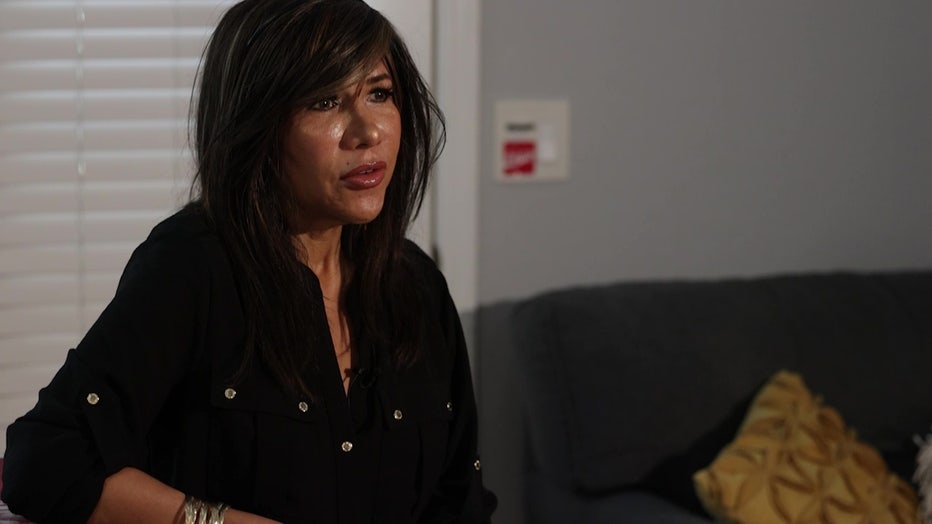
Lorena Gutierrez
"We literally had people passing out, drunk, passed out in our parks, in our porches, our front porches. We would see activity that just wasn’t normal," she said.
There was a common thread between everyone she questioned.
"Everybody we would interview, they would say, ‘They asked me for my information, signed me up for AHCCCS and food stamps,’" Gutierrez recalled.
A lucrative billing code
Before AHCCCS began major reforms to its Medicaid system, there was a lack of oversight as fee-for-service providers billed the state increasingly over the last three fiscal years on one code alone.
Code H0015. "The H0015 billing code is meant for intensive outpatient treatment services for substance use disorder based on an individualized treatment plan, and is only allowed to be billed once per day," AHCCCS' website says.
Costs billed to AHCCCS went from $53.5 million in 2020 to $668 million in 2022.
Non-Native Americans could enroll in the American Indian Health Plan just by signing up over the phone.
That was until June 2023.
The previous loophole allowed fraudsters to not only target Native Americans but all vulnerable people in need of free housing.
Providers also billed on behalf of other providers, upping the risk of fraud, but that’s now restricted.
‘I wish something was done sooner’
We learned Artemis is a behavioral health provider and its clinic is licensed by the Arizona Department of Health Services. As for the house where Monica was found, DHS confirms the property is not licensed for treating patients.
FOX 10 reached Dr. Nilesh Patel who is the co-owner of Artemis.
He declined an interview but said over the phone that the program is still operating from the same sober living home despite not being paid by AHCCCS.
On Nov. 16, a notice to terminate the rental lease at the house where Monica died accused tenants of running a group home with more than ten people, causing property damage and not paying rent.
Artemis of Arizona was suspended back in May. It was one of the dozens of providers accused of fraudulently billing the state’s Medicaid system.
We went to the clinic to find a notice saying Artemis is now locked out for not paying rent. The property manager said the suites have been empty for a while.
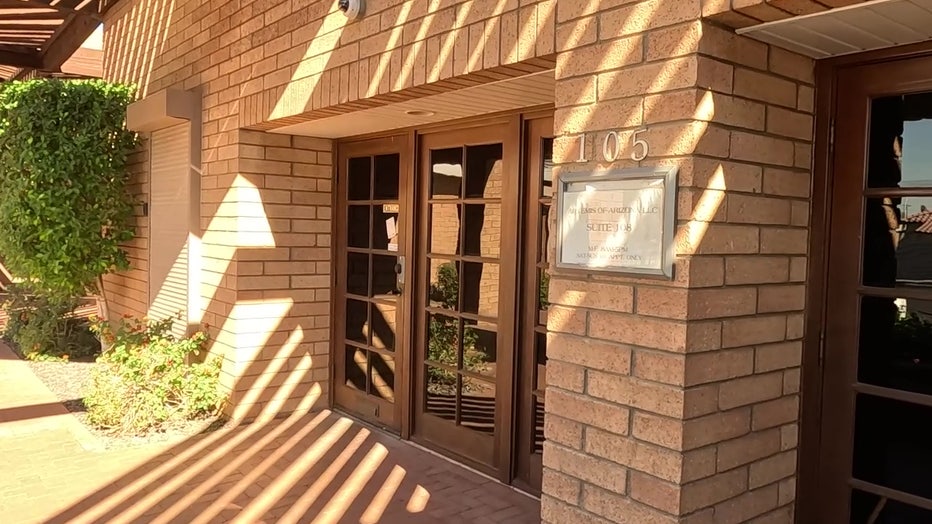
Former office of Artemis of Arizona
It's a crackdown Glendena wishes happened sooner.
"I was happy that they were finally getting down to the bottom of it, but a big part of me was hurt. I was sad and I wish something was done sooner," she said. "I been going through my photos a lot and I do see her every day."
Investigator Justin Lum wants to know how people like Monica are recruited.
Sober living pipeline
Inside the sober living scheme is an x-factor – recruiting – which leads to "patient brokering."
It's all to get paid in kickbacks, the FBI says.
We’ve exposed alleged bad actors in behavioral health, but this time we sat down with a former recruiter.
Former recruiter gives his side
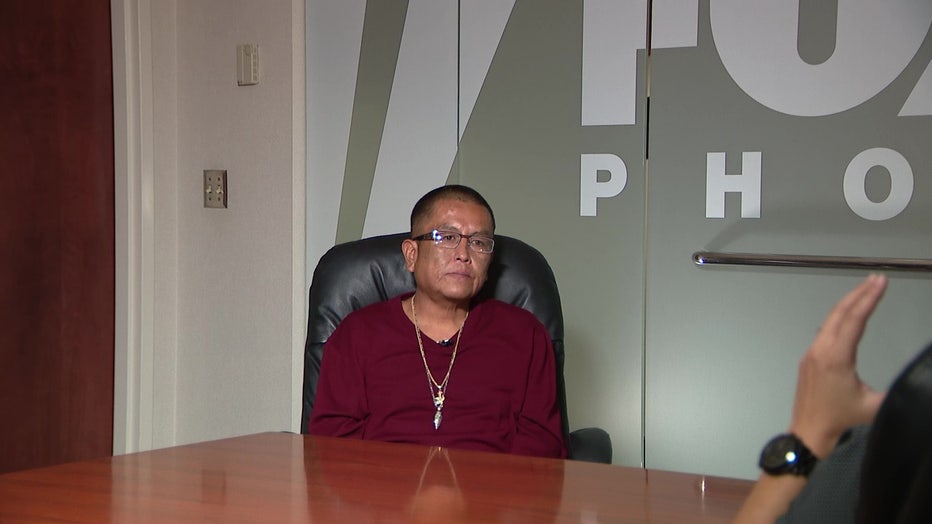
Holyan Shorthair
Holyan Shorthair was one small piece of the puzzle.
He thought he was helping his people, but admits money was his motive.
What does it take to be a recruiter for sober living homes?
"You just really got to get on their level and try to persuade them about the danger of the street," he said.
Holyan says he used to recruit for a behavioral health provider that is now suspended by AHCCCS and was paid under the table to find at-risk Native Americans across the Valley in need of housing and food.
"19th Avenue, Camelback. 19th Avenue and Northern. Mesa, Dobson, that vicinity. San Tan Valley, the Chavez Park, Indian School Park. 47th Avenue, the avenues, Thomas, all the way up to Indian School, Bethany Home," he said describing where he'd find people wanting help. "I mean, they’re everywhere."
Holyan was usually on foot, staying close to light rail stations to find targets. He took their information to help get them signed up for AHCCCS insurance.
Some flew into Arizona from reservations out of state.
"I brought people from North Dakota and Minnesota, Alaska," he said. "It was pretty easy just to get them in. It was a quick call. Uber would pick us up and drop us off directly at the house."
How many clients did he recruit?
"A hundred. A little over a hundred give or take," he said.
Holyan says he was paid a hundred bucks for every person he recruited to the program. He consistently made $1,200-$1,300 a week.
"Eventually, what I found out was how much each individual was worth. I was basically getting peanuts," he said.
He’s right.
'I promised them a change and I failed them'
Up until May 2023, AHCCCS paid out 58% of billed amounts to providers under code H0015.
As of November 2023, the rate is set at about $158 for one unit of service and the code can be billed just once a day.
Remember: The code is meant for intensive outpatient treatment services for substance abuse disorders.
It's now a less lucrative option, but as Holyan says, legitimate services never seemed to be provided.
He says clients were allowed to drink alcohol, abuse drugs and some even overdosed.
"I started questioning and that’s when the money was coming in a little more to keep my mouth shut, but seeing my people dying from alcohol-related deaths under their care is when I really started questioning," he said.
Does he feel guilty and have regrets?
"I really do. I feel bad for the loss of those people and their loved ones. They lost their loved ones and I feel bad because I promised them hope. I promised them shelter, I promised them a change and I failed them," he said.
Holyan is not proud of the part he played but hopes his story can help others avoid red flags.
"Being sober is so beautiful. The more you distance yourself from negativity, the more beautiful things happen if my people can understand how important life is and get on this side for a little while," he said.
With the state weeding out bad actors, and less money for fraudsters to make, what happens to victims of the scheme? Where do they end up?
Facing the fallout
In January 2023, a new governor and attorney general were sworn in for the state of Arizona. The state’s Medicaid agency also got a new director.
Those leaders blame the previous administration for allowing hundreds of millions of dollars to be stolen from the state.
Nearly a year later, more than 300 behavioral health providers were suspended by AHCCCS over allegations of Medicaid fraud.
However, as sober living homes shut down, people are left on the streets.
One advocacy group is stepping up to address the harsh reality. Stolen People, Stolen Benefits.
The organization is named after the issue plaguing the Native American population. This group is on a mission.
"We’ll stop there, feed as many people as we can, and then go up to 19th and Bethany and all the way up to Dunlap," said Reva Stewart, founder of Stolen People, Stolen Benefits.
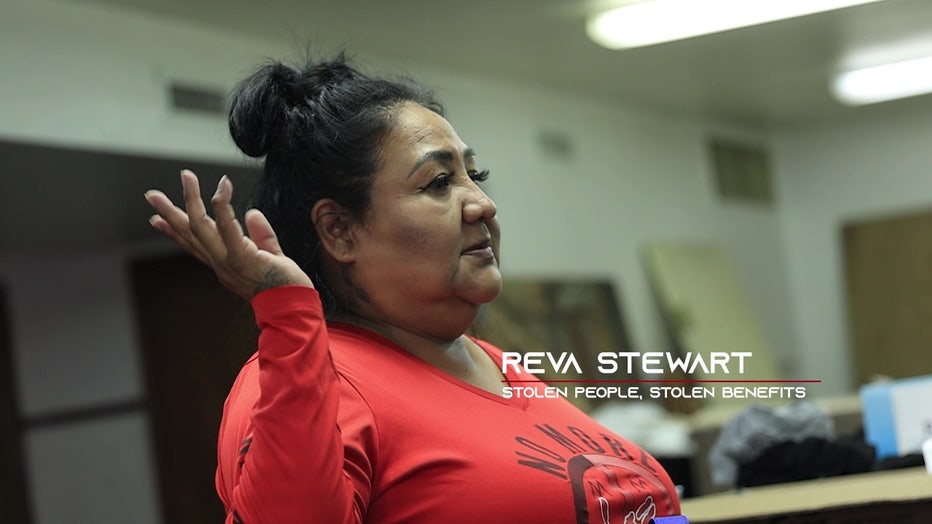
Reva Stewart, founder of Stolen People, Stolen Benefits
We joined Stewart on a night, a night like many others, trying to find relatives kicked out of shady sober living homes.
"What happens is they just get shuffled around and lately we’ve just seen new people that we never talked to before," said Jared Marquez with the organization.
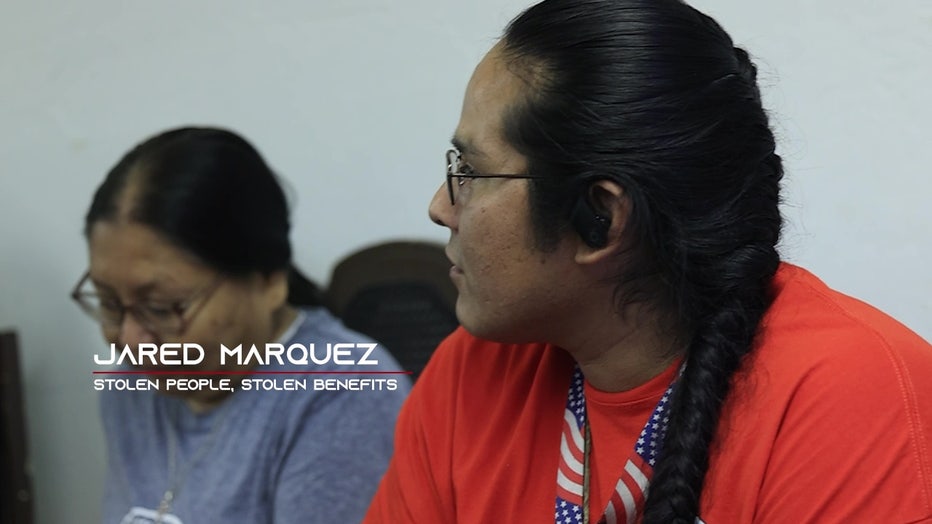
Jared Marquez. Member of Stolen People, Stolen Benefits
Jeri Long is also with Stolen People, Stolen Benefits.
He says, "Yeah, there’s a lot more houses being closed, so that’s why everybody that are now in the houses that are closing down, they’re just letting them out into the streets."
Stewart has seen people recruited outside the Phoenix Indian Medical Center, at bus stops and on streets across the city.
"If you go out as often as we do, you get to know them, and unfortunately, there have been a lot of new unsheltered relatives. A lot of younger ones that don’t know us ask what we’re doing, ask if we’re a sober living home because they get thrown out of one, they want to go to another one," Stewart explained.
The team makes stops near light rail stations, giving away meals and care packages to those in need.
The outreach sparks conversation.
"Where are you from?"
"Window rock."
"What are you doing down here? Were you in a sober living home?"
"I was and then my mom passed away, so after that, I don’t have no family. So I’m stuck out here. I don’t have any family out there or anywhere."
Finding the right help
We meet Wesley Nelson. He’s from Pinon, Arizona in the Navajo Nation.
He says he was recruited to a sober living home in Mesa but at some point, residents were told to leave.
When asked if people were allowed to drink and do drugs at the home, he said, "Yeah."
He added, "They didn’t really supervise."
Stewart steps in to help.
"The next bus I can get him on is at 8:50 in the morning. Do you think you can get there by 8? If you can get there by 7:30 or 8 between 7:30 and 8 I’ll get you the bus ticket and I can get you to the bus station," Stewart told Nelson.
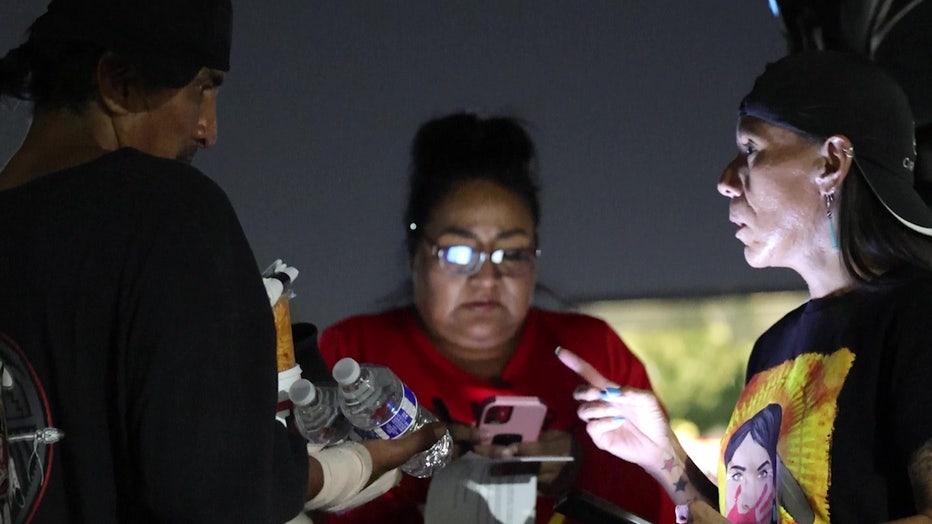
Wesley Nelson (left) talking with Reva Stewart (middle) and Jeri Long (right)
It's a chance for a fresh start after surviving long nights on the streets of Phoenix.
"I wanna go home, man, and get my life straight," Nelson said. "I’ve gone through a lot here, you know? Just drinking and smoking. Just trying to do right for myself, too."
So, what’s different compared to last year's efforts to help get people off the streets?
"The difference is, you see a lot of unsheltered relatives, and now they’re admitting that they were in a sober living home. How many sober living homes, they don’t know," Stewart said. "They don’t know the names, they don’t know which clinic they went to or if they were ever in a clinic."
These victims are oftentimes from New Mexico, Montana, Alaska, South Dakota, Oklahoma, North Dakota, Florida and Nevada. Some even from Minnesota.
‘Broker’ allegedly makes tens of thousands in a month
The influx of Native Americans from reservations across the country end up right here in Arizona.
The Arizona Attorney General's Office is investigating a pattern of unlicensed sober living homes throughout the Phoenix metro area. The scheme offers free medical care, food and housing as long as patients are members of AHCCCS.
This way, they can be "brokered" to behavioral health outpatient programs using their AHCCCS ID numbers to charge the state’s Medicaid agency.
Court documents say one alleged broker told investigators he made $40,000 from one outpatient facility in two months for the patients he brought in.
"Sometimes you’ll see recruiters and they will tell you that, the relatives will tell you, ‘There’s recruiters here,'" Stewart said.
What does that look like exactly?
"Driving by and asking them if they wanna go to a sober living home. My guess is, when you have new people and you don’t see the other ones that we’ve seen, did they go to a sober living home?" Stewart said.
Like Nelson says, these homes are often unmanaged and unsupervised, enabling drug and alcohol abuse.
Raquel Moody lived through the experience herself, bouncing from sober house to sober house where she says no one was really sober.

Raquel Moody, cousin of Carlo Walker
"The ten houses, ten, eleven houses I’ve been to, it was just … the house managers didn’t care," Moody said. She previously interviewed with FOX 10 about the death of her cousin, Carlo Walker, who allegedly went through the same experience as she did.
Jared Marquez with Stolen People, Stolen Benefits described the crisis as, "It’s just another (expletive) house, another (expletive) house that none of the staff are trained in this field to be professionals for peer support. All they’re trained [to do] is to save money and make money. That’s it."
Featured
Arizona's tribal members find unmarked graves in search for loved ones amid sober living crisis
Losing loved ones to a sober living scheme plaguing the Indigenous community – a story many Native Americans share right now in Arizona. There are families searching for missing people who are already dead. "When my family went to find his grave, it was just a number."
‘What is your drug of choice?'
51st Avenue and Baseline Road in Laveen has become a hot spot for unwanted activity, not far from the construction of new homes.
As the FOX 10 crew was in the area with the Stolen People, Stolen Benefits, we saw dozens of people wandering around.
"At least 90% of them came from sober living homes," Jeri Long with Stolen People, Stolen Benefits said.
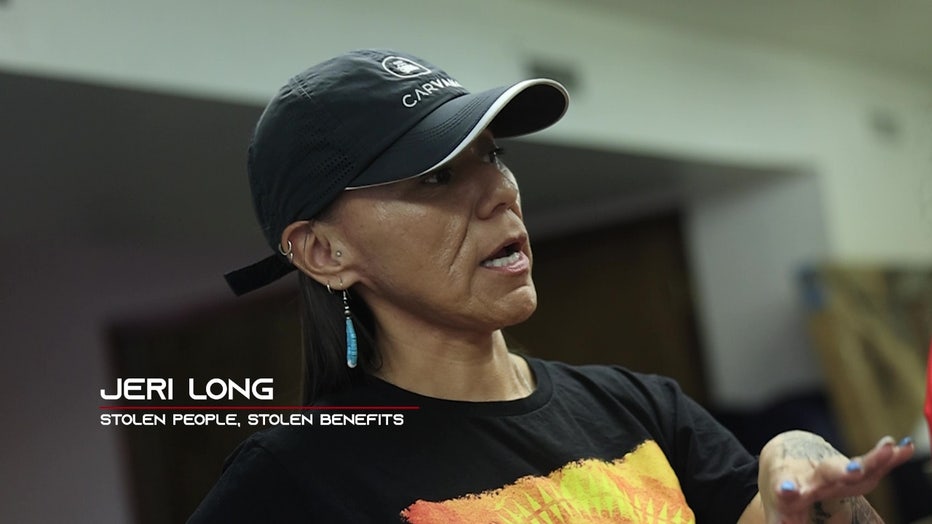
Jeri Long, member of Stolen People, Stolen Benefits
Long spoke with someone who claimed to be staying at a sober living home.
"What is your drug of choice?"
"Alcohol."
"When did you last drink?"
"Like probably an hour ago."
It may take several contacts for advocates like Long to get someone to accept services.
"So, I’m going to set up his aftercare at a legitimate facility," Long said.
One step toward sobriety, but also, a step away from recruiters and fraudsters.
"We had a lot of people ask for help," Long said. "We were able to get one home tomorrow, and we have another going into detox."
The journey back home
Sometimes home is more than a thousand miles away.
Leigha Oldmanchief, of Blackfeet Nation in Montana, says she was staying at a sober living home in Tucson. She says she was ready to leave.
"Practically they were holding me against my will because they were bribing me with money, telling me that they would give me alcohol as long as they didn’t see it," Oldmanchief said to Long.
Long takes her to the airport, so she can fly home to Blackfeet Nation in Montana.
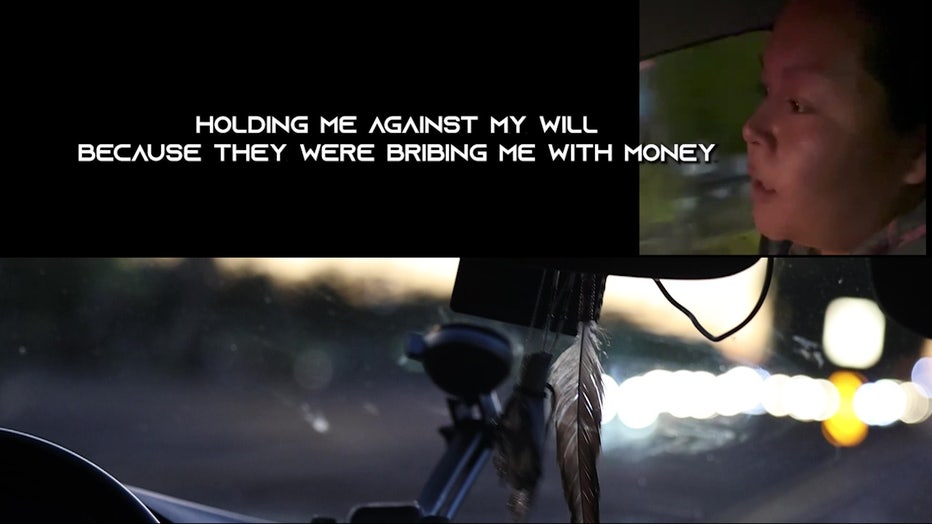
Leigha Oldmanchief
Solutions in Surprise
While state agencies work to crack down on sober living fraud, many cities in Arizona have also been impacted by the scam in the form of unlicensed sober living homes.
As we learned, the city of Surprise tackled the issue before it got out of hand.
A month before Arizona Governor Katie Hobbs announced a statewide crackdown on fake rehab centers and Medicaid fraud, the city of Surprise knew there was a problem.
Several residents voiced concerns to Surprise officials about unlicensed sober living homes in their neighborhoods on April 4, 2023.
Here are some of the concerns they voiced:
- "This has created a very dangerous situation for me and my family."
- "They operate for six months, they get an investigation, they shut down, open up a different, sign up for a different LLC, and pop up in another house three blocks down."
- "He was so high he literally couldn’t walk from me to you straight. I’m in fear of my life."
- "They’re doing profit sharing with treatment centers where they’re saying they’re going there, fraudulently documenting that they’re receiving substance abuse services and then cost sharing for the offsetting for the sober living."
"That’s when we finally put all the pieces together. When people started showing up at the meetings for our city of Surprise and other people were coming forward with that information, that’s when we put it together that that’s what this house was about," Lynnette Iresabal, a Surprise resident, said.
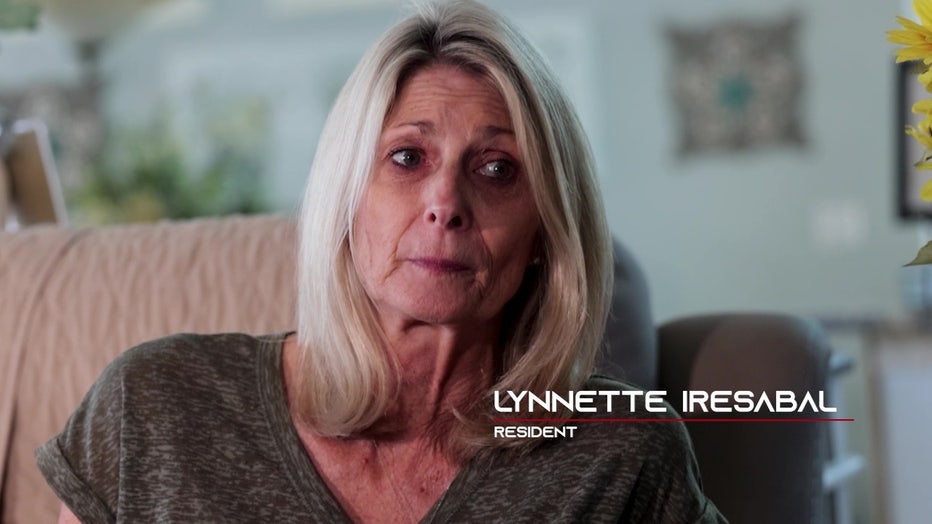
Lynnette Iresabal, Surprise resident
She lives in Bell West Ranch near Bell Road and Loop 303. She says earlier this year, she started seeing strange activity outside her home.
"There was people coming and going, there was no supervision," she said. Iresabal describes seeing drug use, garbage on the street and transients pushing shopping carts.
Anthony Johnson is another resident who witnessed the same.
"People were staggering around the neighborhood. Falling down. Some of the erratic behavior we saw just wasn’t common in our community," Johnson said.
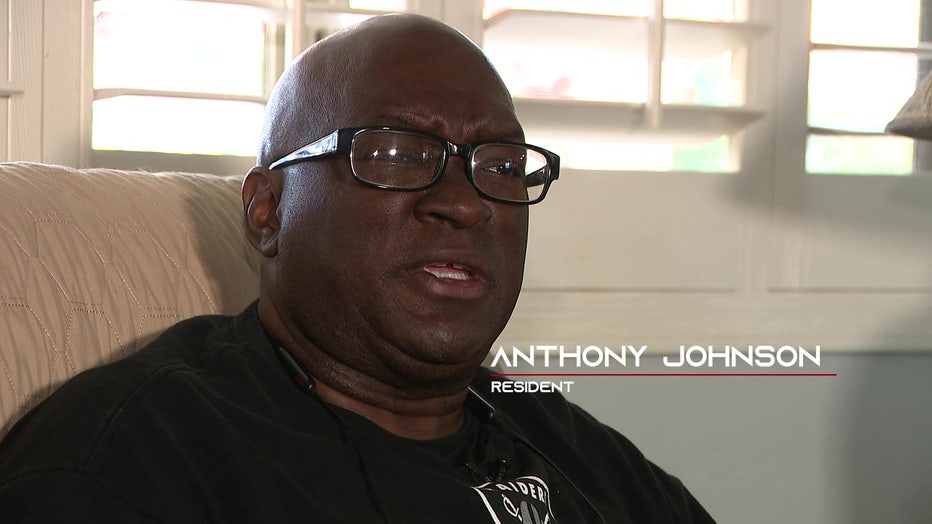
Anthony Johnson, Surprise resident
‘That anger turned into me being fired up’
Nick Haney represents District 1 on Surprise's City Council.
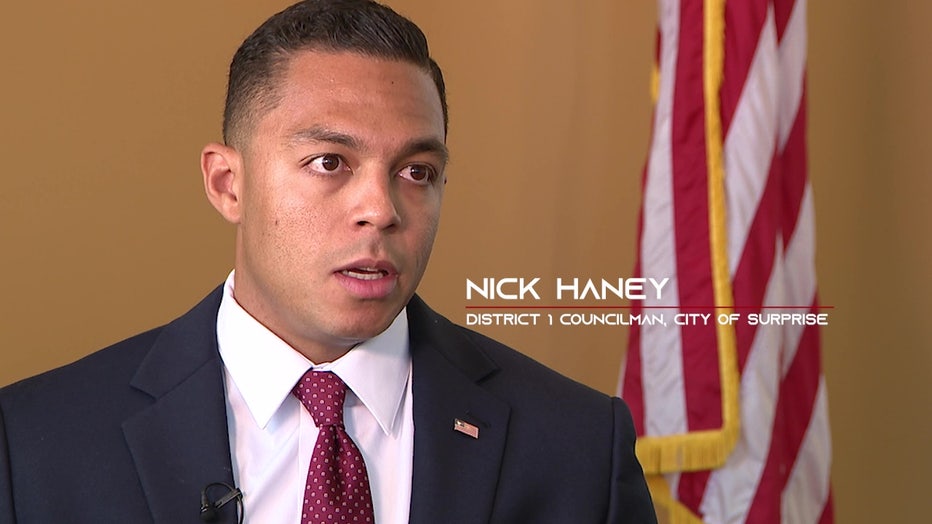
Nick Haney represents District 1 on Surprise's City Council
"I would say pretty early in my term, mid to late January, I had a resident reach out earlier just inquiring about sober living homes and at that time we just really weren’t sure what was going on," he said.
Haney would find out soon enough.
The city of Surprise did its research. It learned a sober living home could profit $180,000 annually from one person on the American Indian Health Plan.
Data from March 2023 reveals there were 40 known sober living homes in Surprise, but not licensed by the city or state.
No licensing through Arizona's Department of Health Services means no oversight and city officials say that leads to unsafe conditions for people in recovery while bringing blight and crime into neighborhoods.
Calls for service to Surprise Police spiked in March.
"I was angry initially. That anger turned into me being fired up because I was in a position to do something about it," Haney said.
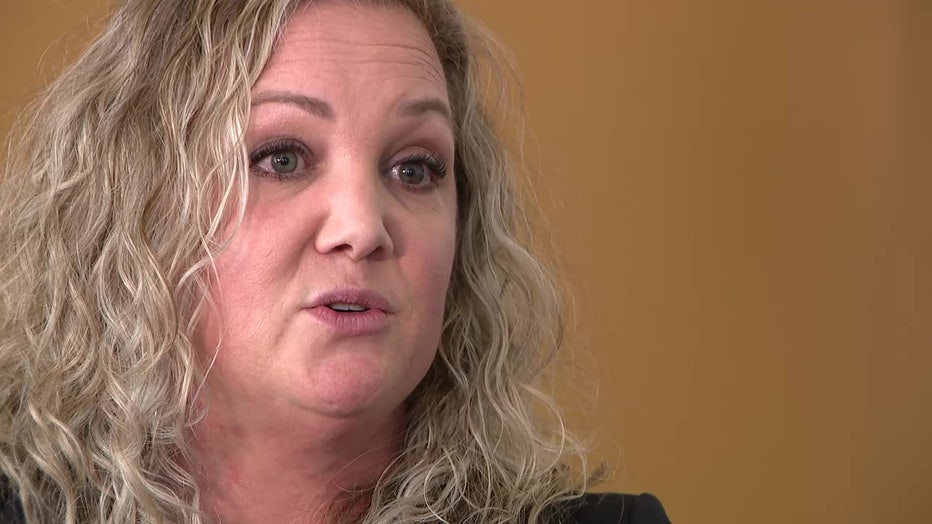
Tiffany Copp, assistant director of community development for the city of Surprise
Tiffany Copp is the assistant director of community development for the city of Surprise.
She says, "I think what we came to understand was that this issue popped up in our city and there’s not a lot we can do to proactively prevent it."
Changes are happening in neighborhoods
So, what has Surprise done to tackle the sober living issue?
The council adopted a short-term rental ordinance that prohibits those types of properties from being used as sober living homes. There’s also a group home licensing process that requires annual inspections and renewal fees.
Violating business licensing requirements, the short-term rental ordinance or zoning laws can lead to a direct citation issued by code enforcement.
The city’s goal is to respond to a complaint on an unlicensed sober living home in less than 48 hours.
An inspection is done and once the allegation is confirmed, a criminal citation is issued to the business owner with a date in city court as well as a notice of violation.
The window to get in compliance is 15 days.
"That’s just us going to the home and saying, ‘We see that you’re here, we see that you don’t have your DHS license, you’re not meeting our zoning requirements, here’s your civil citation to go to court and explain why that is,'" Copp said.
From January through mid-August 2023, code enforcement has investigated 137 complaints of unlawful sober living homes, and has closed 111 cases.
Many of these homes voluntarily shut down and move on.
"We’ve had some point-blank tell us, ‘We’re moving to the neighboring jurisdiction,’ or, ‘That’s OK. We’ll close this house. We have other houses elsewhere,’" Copp said.
That intel is communicated to the next city.
For residents like Johnson, the sober living problem is resolved. For now.
"House is empty. Went back to quiet. We and my kids know that, and they’re OK with riding out in front of the home again," Johnson said. "Neighbors are talking, and we’re not nervous that somebody can come knock on our door at any moment, day or night, asking for food, asking for this. Things are different now."




